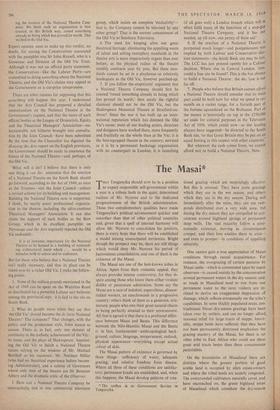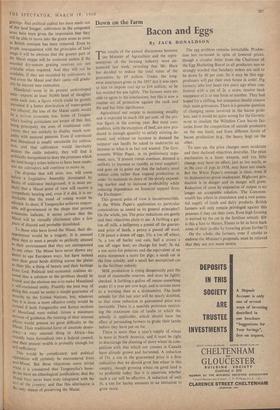The Masai*
IHAT Tanganyika should now be in a position to expect responsible self-government within a year is a tribute both to the quiet, determined realism of Mr. Nyerere and to the dedicated progressiveness of the British administration. These two complementary qualities have made Tanganyika's political advancement quicker and smoother than that of other political countries and, given that a spell of internal harmony will allow. Mr. Nyerere to consolidate his position, there is every hope that there will be established a model among emancipated territories. Bright though the prospect may be, there are still things which would deny Mr. Nyerere his period of harmonious consolidation, and one of them is the existence of the Masai.
The Masai ate one of the best-known tribes in Africa. Apart from their romantic appeal, they always provoke intense controversy, for they in- spire among those who know them either virulent dislike or passionate admiration. Some say the Masai are a race of indolent, supercilious, disease- ridden wasters, an anachronisrh in a progressive country; others think of them as a generous, aris- tocratic people who owe their great natural charm to being perfectly attuned to their environment. All that is agreed is that there is a profound differ- ence between Masai and Bantu. This difference between the Nilo-Hamitic Masai and the Bantu is, in fact, fundamental—anthropological back- ground, culture, language, temperament, outlook, physical appearance—everything except actual colour of skin.
The Masai pattern of existence is governed by three things : sufficiency of water; adequate grazing; and relative freedom from disease. Where all three of these conditions are satisfac- tory, permanent kraals are established, and, when this happens, the Masai develop patterns of rota- * The author is in Government Service in Tanganyika. tional grazing which are surprisingly effective., But this is unusual. They haVe some grazings which they use in the wet season, and others which they use in the dry season. During and immediately after the rains, they can use rain- ponds distributed over a very wide area; but during the dry season they are compelled to con- centrate around highland springs or permanent deep wells. The vast majority follow a semi- nomadic existence, moving as circumstances compel; and their lore enables them to exist— and even to prosper—in conditions of appalling adversity. • One cannot gain a true appreciation of Masai conditions through casual acquaintance. For instance, the overgrazing of certain pastures by Masai cattle—which is commented upon by many observers—is caused mainly by the concentration around permanent waters in the dry season; and, as roads in Masailand tend to run from one permanent water to the next, visitors are in- clined to derive 'an exaggerated impression of damage, which reflects erroneously on the tribe's capabilities. In some thickly populated areas, too. traditional Masai dry-season grazings have been taken over by settlers, and can no longer afford, seasonal relief for large tracts of steppe. Inevit- ably, steppe lands have suffered; that they have not been permanently destroyed emphasises the grazing mastery of the Masai, for there is no other tribe in East Africa who could use these great arid tracts better than these consummate pastoralists.
On the boundaries of Masailand there are districts where the greater portion of good arable land is occupied by alien estate-owners and where the tribal lands are acutely congested. The overcrowded cultivators naturally covet, and have encroached on, the green highland areas of Masailand which constitute the . dry-season
grazings. And political capital has been made out of this land hunger; cultivators in the congested areas have been given the impression that they will be able to move into the green areas as soon as British restraint has been removed. Even to People unacquainted with the ,principles of land usage it will be obvious that the greater part of the Masai steppe will be rendered useless if the essential dry-season grazing reserves are not available when required. And they will not be available, if they are occupied by cultivators; in that event the Masai and their cattle will gradu- ally be starved into extinction.
Masailand—even in its present undeveloped state--exports at least 30,000 head of slaughter cattle each year, a figure which could be greatly increased if a better distribution of water-points was effected; the loss of the Masai cattle would be a serious economic loss. Some of Tangan- yika's leading politicians are'aware of this; but, being principally the sons of traditional cultt- vat°rs, they are unlikely to display much sym- Pathy, with pastoral patterns. Even if convinced that Masailand is totally unsuitable for cultiva- tion, and that cultivation would inevitably destroy the cattle industry, they will find it politically inexpedient to deny the promises which the land-hungry tribes believe to have been made; and the cultivators will continue to move in.
The disputes that will arise, too, will come before a Legislative Assembly dominated by Bantu of cultivator background; it is most un- likely that a Masai point of view will receive a sYrnpathetic hearing and even if it did, it is un- thinkable that the trend of voting would he affected. In short, if Tanganyika achieves respon- sible self-government in the shape that present tendencies indicate, it seems certain that the Masai will be virtually eliminated after a few Years of discord and probable bloodshed. To those who have loved the Masai, their dis- appearance would be a tragedy. It is unusual these days to meet a people so perfectly attuned to their environment that they are unimpressed by any other. The Masai have never shown any desire to ape European ways, but have instead seen their great herds drifting across the plains al their life, a thing of beauty and their heritage fr°111 God. Political and economic realities de- Maud that a solution to the problem should be f°und; and the obvious one is to make Masailand a self-contained entity. Possibly the best way of (10Ing this would be under a simple guarantee of security by the United Nations, but, whatever way it is done, a more effective entity would be created if both Tanganyika and Kenya sections Masailand were united. Given a minimum amount of guidance, the running of their internal allairs would present no great difficulty to the Masai. Their traditional form of absolute demo- eraeY----a very unusual thing in Africa—has recently been formalised into a federal council, and their present wealth is probably enough for self-sufficiency. This would be complicated; and political °PPosition will certainly be encountered from min-Masai. But these objections seem trivial when it is considered that Tanganyika's boun- daries have no ethnological justification; that the Masai have never been truly integrated with the rest of the country: and that this alternative is th. only means of preserving the Masai.



































 Previous page
Previous page